A Legacy of Learning
When Qatar hosts one of the greatest sporting shows on earth in 2022 – the FIFA World Cup – it will be more than a showcase of football excellence. It will be a tournament that leaves a lasting legacy for Qatar and the region.
And, in June, the way this legacy will be reflected within Qatar Foundation (QF) was placed in focus as Qatar announced the completion of the Education City Stadium, the third tournament-ready World Cup venue.
Nicknamed ‘the Diamond in the Desert’, the 40,000-capacity venue within QF’s Education City sets a new global benchmark for sustainability – and has been designed with a post-2022 future in mind.
When Qatar hosts one of the greatest sporting shows on earth in 2022 – the FIFA World Cup – it will be more than a showcase of football excellence. It will be a tournament that leaves a lasting legacy for Qatar and the region.
And, in June, the way this legacy will be reflected within Qatar Foundation (QF) was placed in focus as Qatar announced the completion of the Education City Stadium, the third tournament-ready World Cup venue.
Nicknamed ‘the Diamond in the Desert’, the 40,000-capacity venue within QF’s Education City sets a new global benchmark for sustainability – and has been designed with a post-2022 future in mind.
A key element of the Education City Stadium’s future role within QF’s landscape of knowledge was revealed – as graduating students from the organization’s schools turned their minds toward a new stage of their learning journey.
👩⚕️👨⚕️Frontline workers in the spotlight as Education City Stadium is unveiled Stadium 🏟️#COVID19 #championsofhope #Qatar2022 #beINRoadTo2022 pic.twitter.com/UwgUVUsGYZ
— beIN SPORTS (@beINSPORTS_EN) June 16, 2020
At the heart of a community
Following its unveiling, QF revealed how the stadium, in its legacy phase after the World Cup, will become home to two progressive schools under QF’s Pre-University Education: Academyati and Qatar Academy for Science and Technology. Part of the venue will house buildings for each school, with a third building containing shared facilities for both.
“The Education City Stadium has always been intended to create a legacy, and this will be perfectly reflected in its post-World Cup role as a center for learning, creativity, and discovery,” said Buthaina Ali Al Nuaimi, President of Pre-University Education, QF.
“With Academyati and Qatar Academy for Science and Technology being a vibrant part of its precinct, the Education City Stadium will have a true community feel once the World Cup has concluded. The young learners who begin to develop the skills that will shape their lives within the stadium will be a living embodiment of its enduring value to Qatar, illustrating that while this is a wonderful sporting arena, it is also so much more.”
Following its unveiling, QF revealed how the stadium, in its legacy phase after the World Cup, will become home to two progressive schools under QF’s Pre-University Education: Academyati and Qatar Academy for Science and Technology. Part of the venue will house buildings for each school, with a third building containing shared facilities for both.
“The Education City Stadium has always been intended to create a legacy, and this will be perfectly reflected in its post-World Cup role as a center for learning, creativity, and discovery,” said Buthaina Ali Al Nuaimi, President of Pre-University Education, QF.
“With Academyati and Qatar Academy for Science and Technology being a vibrant part of its precinct, the Education City Stadium will have a true community feel once the World Cup has concluded. The young learners who begin to develop the skills that will shape their lives within the stadium will be a living embodiment of its enduring value to Qatar, illustrating that while this is a wonderful sporting arena, it is also so much more.”
The Education City Stadium has always been intended to create a legacy, and this will be perfectly reflected in its post-World Cup role as a center for learning, creativity, and discovery
Xavi has hailed the opening of Education City Stadium, noting it's a important symbol of the worlds recovery from #COVID19#Qatar2022https://t.co/F1v3M6nuqP
— beIN SPORTS (@beINSPORTS_EN) June 30, 2020
The ambition of youth
While many current and future QF school students can look forward to their learning journey taking place next to a World Cup stadium, others took the next step on that journey in 2020 as they graduated from schools where the value of creativity, curiosity, innovation, cultural understanding, and constantly seeking knowledge has been instilled in them.
Almost 500 students at QF’s schools graduated in the summer, and among them was Rowida Mounier – who, aged just 14, is the youngest-ever graduate of the Academic Bridge Program, a QF program that helps high school graduates gain acceptance to English-speaking universities in Qatar and around the world.
“My friends at school would joke with me and say ‘you went to school as soon as you were born’,” said Rowida, who was able to study all levels up to Grade 7 in just two years, and now plans to study medicine and genomics “to try to discover treatments for genetic disorders, and help the community.”
While many current and future QF school students can look forward to their learning journey taking place next to a World Cup stadium, others took the next step on that journey in 2020 as they graduated from schools where the value of creativity, curiosity, innovation, cultural understanding, and constantly seeking knowledge has been instilled in them.
Almost 500 students at QF’s schools graduated in the summer, and among them was Rowida Mounier – who, aged just 14, is the youngest-ever graduate of the Academic Bridge Program, a QF program that helps high school graduates gain acceptance to English-speaking universities in Qatar and around the world.
“My friends at school would joke with me and say ‘you went to school as soon as you were born’,” said Rowida, who was able to study all levels up to Grade 7 in just two years, and now plans to study medicine and genomics “to try to discover treatments for genetic disorders, and help the community.”
The Academic Bridge Program has graduated 3,741 students since 2002
A positive mindset
While the pandemic denied the 2020 graduates from QF schools the opportunity to celebrate their achievements together, it could not dampen their enthusiasm and optimism for the future.
As Qatar Academy Al Khor (QAK) graduate Rahaf Ibrahim Al-Mohannadi explained: “This new phase of my life is going to teach me new things and allow me to experience what I’ve never experienced before.
“We have to believe that everything happens for a reason, be hopeful, and continue aiming to reach our goals and dreams.”
And Rahaf’s fellow QAK graduate Aldana Jubran Al-Abdlie also encapsulated the resolute spirit of students across QF in the face of COVID-19, as she said: “It’s better to look at things positively, rather than dwell on a past we can’t change – just as we found alternative ways of keeping life moving during this pandemic, we can continue to do so in the future.”
While the pandemic denied the 2020 graduates from QF schools the opportunity to celebrate their achievements together, it could not dampen their enthusiasm and optimism for the future.
As Qatar Academy Al Khor (QAK) graduate Rahaf Ibrahim Al-Mohannadi explained: “This new phase of my life is going to teach me new things and allow me to experience what I’ve never experienced before.
“We have to believe that everything happens for a reason, be hopeful, and continue aiming to reach our goals and dreams.”
And Rahaf’s fellow QAK graduate Aldana Jubran Al-Abdlie also encapsulated the resolute spirit of students across QF in the face of COVID-19, as she said: “It’s better to look at things positively, rather than dwell on a past we can’t change – just as we found alternative ways of keeping life moving during this pandemic, we can continue to do so in the future.”
We have to believe that everything happens for a reason, be hopeful, and continue aiming to reach our goals and dreams
5,650 Students have graduated from QF schools – including 487 in 2020
In the 2019-20 academic year, QF schools had:
- 6,235 students of 59 nationalities
- 569 teachers of 72 nationalities
Reaching across borders
QF’s efforts to help keep life moving – and keep lives safe – were seen both at home and abroad in June.
Through a partnership between QF, Hamad Medical Corporation, and the Embassy of Italy, plasma from recovered COVID-19 patients in Qatar was flown to Italy with the aim of supporting the development of treatments for the virus. Longstanding ties between Qatar and Italy led to the scientific collaboration that resulted in the convalescent plasma samples (CP) being transported from Doha to an Italian hospital to be studied.
Although CP from COVID-19 patients is rich in antibodies that can help fight the virus, data on this is limited. The Qatar-Italy scientific project was launched with the aim of finding evidence that CP has enough neutralizing antibodies to treat virus patients.
“Science, research, and technology – and consequently humanity – benefit when local and international experts join forces to address common challenges,” said Dr. Richard O’Kennedy, Vice President of Research, Development and Innovation at Qatar Foundation.
QF’s efforts to help keep life moving – and keep lives safe – were seen both at home and abroad in June.
Through a partnership between QF, Hamad Medical Corporation, and the Embassy of Italy, plasma from recovered COVID-19 patients in Qatar was flown to Italy with the aim of supporting the development of treatments for the virus. Longstanding ties between Qatar and Italy led to the scientific collaboration that resulted in the convalescent plasma samples (CP) being transported from Doha to an Italian hospital to be studied.
Although CP from COVID-19 patients is rich in antibodies that can help fight the virus, data on this is limited. The Qatar-Italy scientific project was launched with the aim of finding evidence that CP has enough neutralizing antibodies to treat virus patients.
“Science, research, and technology – and consequently humanity – benefit when local and international experts join forces to address common challenges,” said Dr. Richard O’Kennedy, Vice President of Research, Development and Innovation at Qatar Foundation.
Science, research, and technology – and consequently humanity – benefit when local and international experts join forces to address common challenges
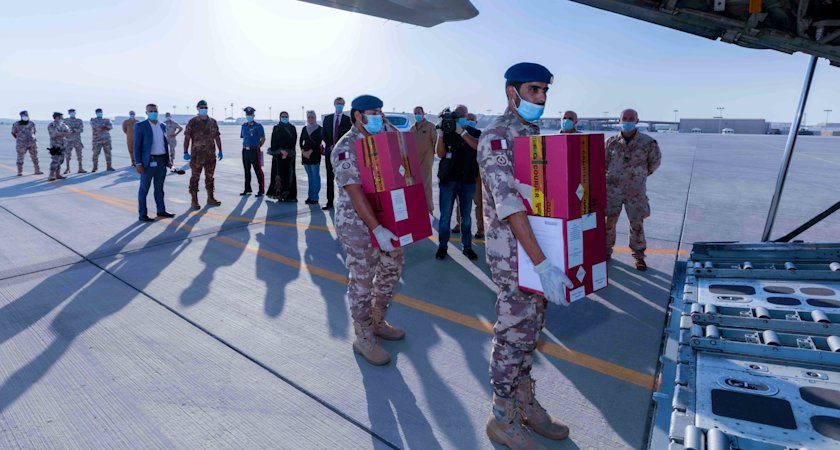
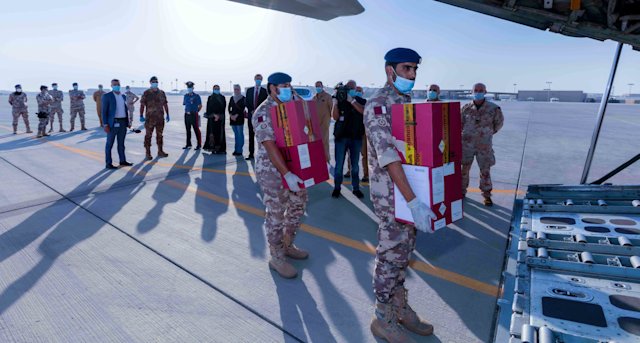
Homegrown solutions
Sidra Medicine developed a simplified, rapid COVID-19 testing method – the second to emerge from the QF member in a matter of months – to provide back-up in case global shortages of the reagents needed for virus tests ran short, while also expanding testing capacity through being cheaper and having quicker turnaround times.
Meanwhile, QF partner university Virginia Commonwealth University School of the Arts in Qatar played its part in protecting Qatar’s newborns from COVID-19, by making shields for infants in the Neonatal Intensive Care Units (NICUs) at Hamad Medical Corporation (HMC) and Doha’s Cuban Hospital.
Dr. Mai Al-Qubaisi, Medical Director of HMC’s NICU, was searching for a way of protecting the infants in her care from the virus when she found that, rather than importing face shields, the answer lay on her doorstep. “Not for a moment did I think I would be able to have them manufactured in my own country,” she said.
“It’s wonderful what can happen when people work together for a common purpose.”
Sidra Medicine developed a simplified, rapid COVID-19 testing method – the second to emerge from the QF member in a matter of months – to provide back-up in case global shortages of the reagents needed for virus tests ran short, while also expanding testing capacity through being cheaper and having quicker turnaround times.
Meanwhile, QF partner university Virginia Commonwealth University School of the Arts in Qatar played its part in protecting Qatar’s newborns from COVID-19, by making shields for infants in the Neonatal Intensive Care Units (NICUs) at Hamad Medical Corporation (HMC) and Doha’s Cuban Hospital.
Dr. Mai Al-Qubaisi, Medical Director of HMC’s NICU, was searching for a way of protecting the infants in her care from the virus when she found that, rather than importing face shields, the answer lay on her doorstep. “Not for a moment did I think I would be able to have them manufactured in my own country,” she said.
“It’s wonderful what can happen when people work together for a common purpose.”
It’s wonderful what can happen when people work together for a common purpose
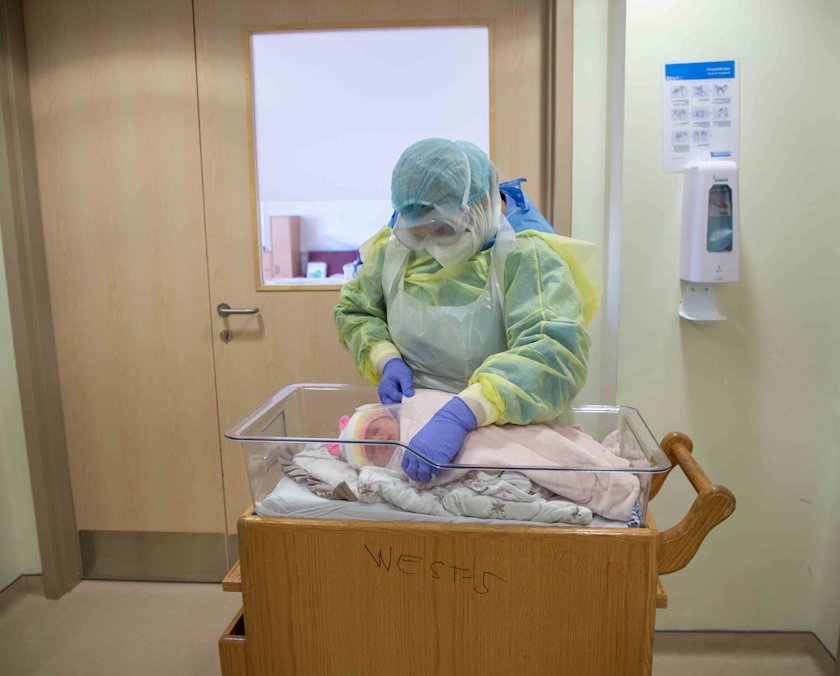
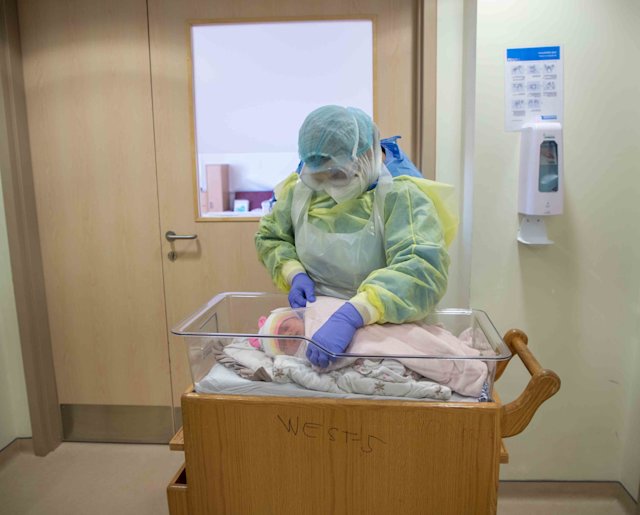
Skills for life
With partners from Turkey, Morocco, and Lebanon, the College of Islamic Studies (CIS) at QF’s Hamad Bin Khalifa University (HBKU) held the region’s first virtual summer school, ‘Design Post-COVID Normal’.
Focused around unearthing new solutions to issues accelerated by the pandemic – especially those related to the United Nations Sustainable Development Goals (SDGs) – the school attracted 111 students from 20 countries. In groups, they were tasked with developing projects based on design solutions within the context of a particular SDG.
“We created this program because we wanted students to use the skills they have developed in all aspects of their lives,” explained Dr. Evren Tok, Associate Professor and Dean of Innovation and Community Engagement at CIS. “Students can carry forward the skills they have learned to make a significant impact,”
“We do not want this program to stop after four weeks, but for students to utilize what they have learned during the course when they one day become leaders and make decisions that affect communities worldwide.”
With partners from Turkey, Morocco, and Lebanon, the College of Islamic Studies (CIS) at QF’s Hamad Bin Khalifa University (HBKU) held the region’s first virtual summer school, ‘Design Post-COVID Normal’.
Focused around unearthing new solutions to issues accelerated by the pandemic – especially those related to the United Nations Sustainable Development Goals (SDGs) – the school attracted 111 students from 20 countries. In groups, they were tasked with developing projects based on design solutions within the context of a particular SDG.
“We created this program because we wanted students to use the skills they have developed in all aspects of their lives,” explained Dr. Evren Tok, Associate Professor and Dean of Innovation and Community Engagement at CIS. “Students can carry forward the skills they have learned to make a significant impact,”
“We do not want this program to stop after four weeks, but for students to utilize what they have learned during the course when they one day become leaders and make decisions that affect communities worldwide.”
We created this program because we wanted students to use the skills they have developed in all aspects of their lives
HBKU’s College of Islamic Studies offers 6 academic programs
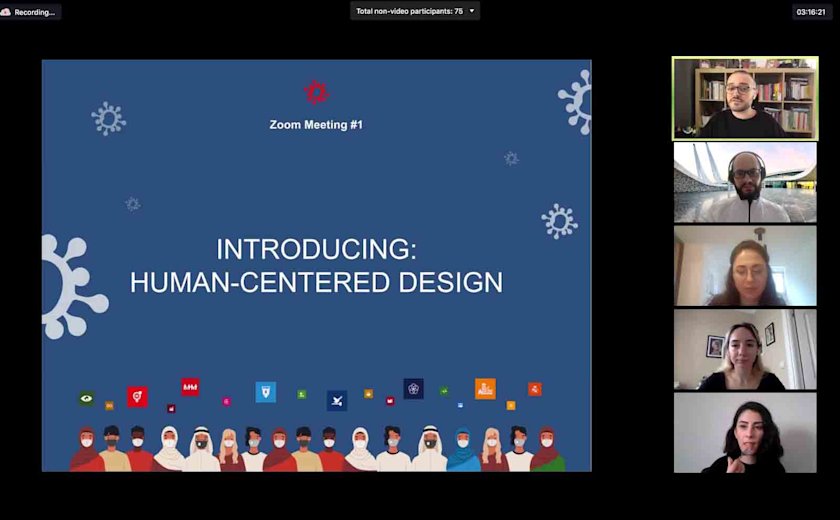
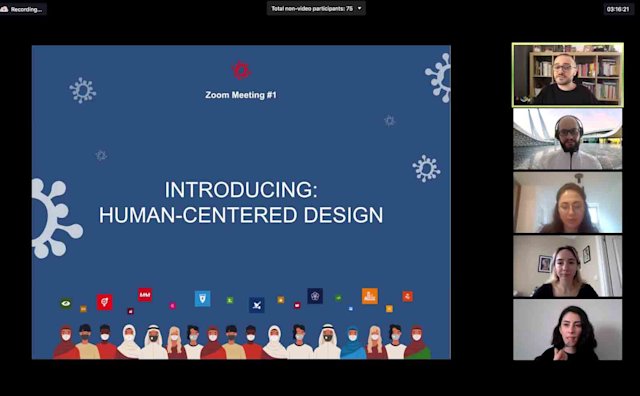
Exploring stories, appreciating families
Through a HBKU research grant, two professors at QF partner university Northwestern University in Qatar got to work on developing a mobile gaming platform that can teach people about infectious diseases – and containing them.
Dr Sara: Disease Detective will allow players to explore a pandemic in a character-driven simulation, learning about epidemiology, contact tracing, and the world of contagion while solving puzzles and being part of an unfolding story that helps them understand the challenges that disease control creates.
And QF member Doha International Family Institute (DIFI_ emphasized how the pandemic can strengthen family bonds, as – during a symposium on ‘Family and the Digital Transformation’ organized by Morocco’s Center for Family Studies and Research in Values and Law – it presented research illustrating the family benefits that remote working brings.
“The pandemic can make families feel scared or anxious,” said Dr. Sharifa Al Emadi, Executive Director of DIFI. “That’s why it is important to remember this is an opportunity to appreciate our families, and to spend more quality time with them.”
Through a HBKU research grant, two professors at QF partner university Northwestern University in Qatar got to work on developing a mobile gaming platform that can teach people about infectious diseases – and containing them.
Dr Sara: Disease Detective will allow players to explore a pandemic in a character-driven simulation, learning about epidemiology, contact tracing, and the world of contagion while solving puzzles and being part of an unfolding story that helps them understand the challenges that disease control creates.
And QF member Doha International Family Institute (DIFI_ emphasized how the pandemic can strengthen family bonds, as – during a symposium on ‘Family and the Digital Transformation’ organized by Morocco’s Center for Family Studies and Research in Values and Law – it presented research illustrating the family benefits that remote working brings.
“The pandemic can make families feel scared or anxious,” said Dr. Sharifa Al Emadi, Executive Director of DIFI. “That’s why it is important to remember this is an opportunity to appreciate our families, and to spend more quality time with them.”
It is important to remember this is an opportunity to appreciate our families, and to spend more quality time with them
DIFI’s focus on the Arab family is built around:
- Advocacy
- Research
- Policy
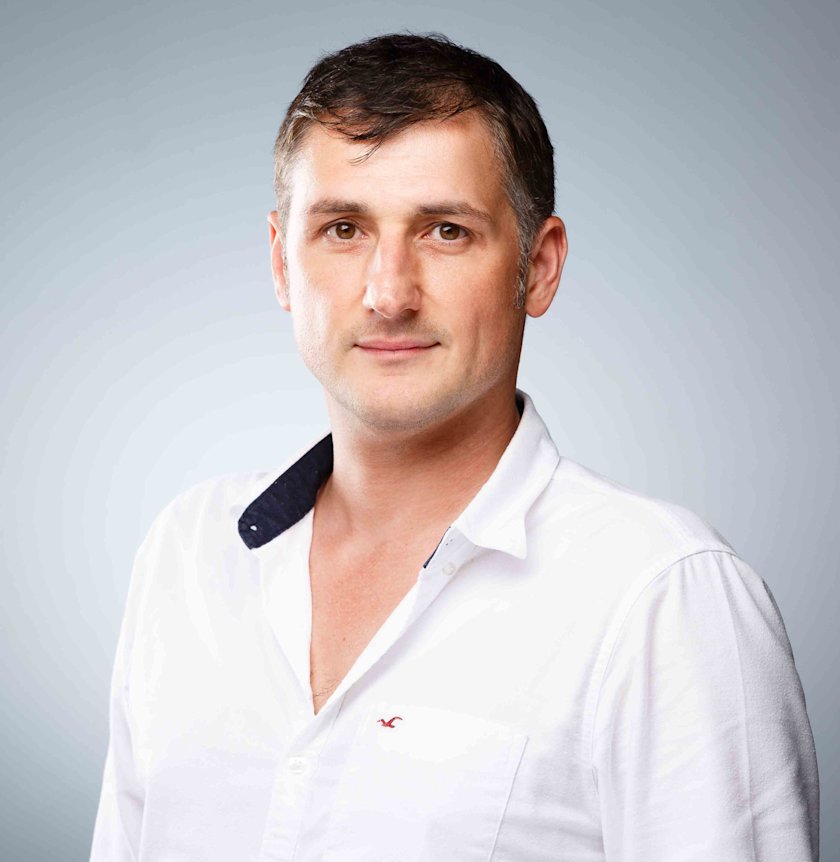
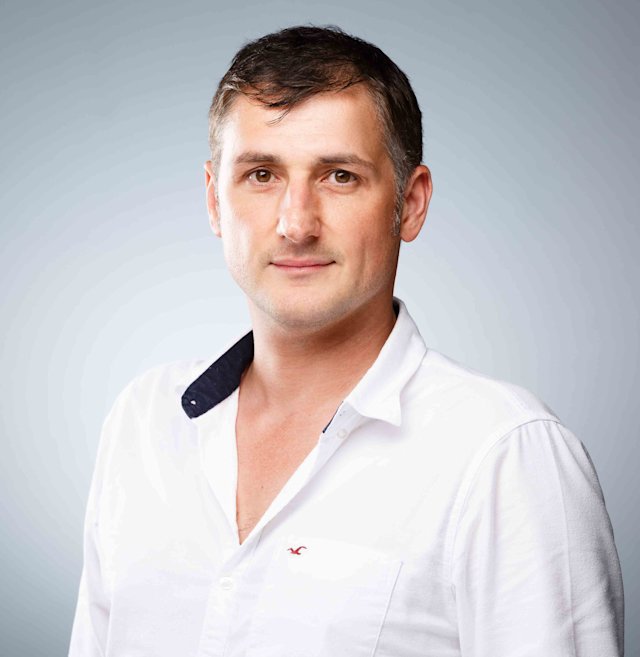
Dedicated to breakthroughs
While COVID-19 is a new health challenge for the world, Parkinson’s disease has been a scourge of lives for decades.
The quest to develop immunotherapy against it was boosted in June as a team from HBKU’s Qatar Biomedical Research Institute (QBRI) provided the novel diagnostic technology used in the successful first phase of clinical trials in Europe.
Experts in the field of neurodegenerative diseases from QBRI lent their knowledge to efforts by an Austrian biopharmaceutical company to evaluate biomarkers for Parkinson’s, among them the institute’s executive director Dr. Omar El-Agnaf, who said: “Millions of people have to deal with this condition every day of their lives, and finding an immunotherapy is so important.
“Our researchers are again demonstrating how QBRI is committed to paving the way for new breakthroughs in medicine, addressing the key healthcare challenges facing Qatar and the world.”
While COVID-19 is a new health challenge for the world, Parkinson’s disease has been a scourge of lives for decades.
The quest to develop immunotherapy against it was boosted in June as a team from HBKU’s Qatar Biomedical Research Institute (QBRI) provided the novel diagnostic technology used in the successful first phase of clinical trials in Europe.
Experts in the field of neurodegenerative diseases from QBRI lent their knowledge to efforts by an Austrian biopharmaceutical company to evaluate biomarkers for Parkinson’s, among them the institute’s executive director Dr. Omar El-Agnaf, who said: “Millions of people have to deal with this condition every day of their lives, and finding an immunotherapy is so important.
“Our researchers are again demonstrating how QBRI is committed to paving the way for new breakthroughs in medicine, addressing the key healthcare challenges facing Qatar and the world.”
Our researchers are again demonstrating how QBRI is committed to paving the way for new breakthroughs in medicine
QBRI houses three centers of research excellence
- Cancer Research Center
- Diabetes Research Center
- Neurological Disorders Research Center
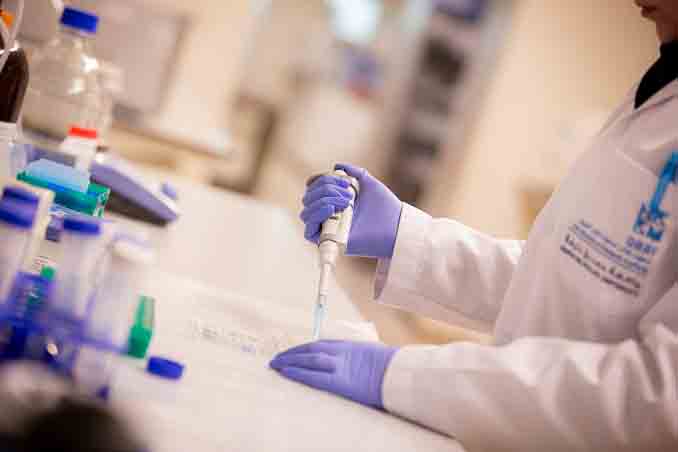
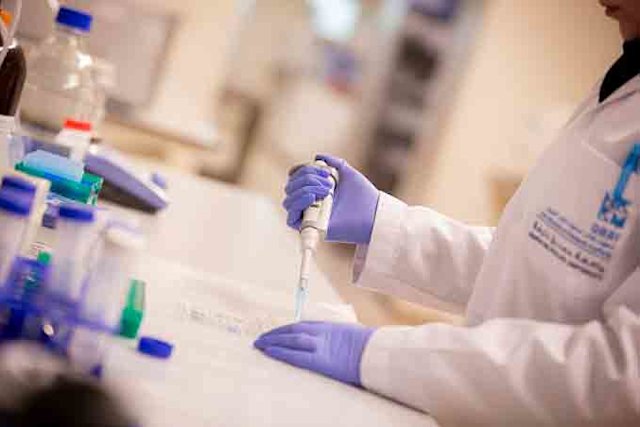
From laboratory to clinic
The month also saw the emergence of new knowledge from QF on another of Qatar and the region’s biggest health issues – diabetes.
A study led by clinical researchers at QF partner university Weill Cornell Medicine-Qatar (QCM-Q) revealed, for the first time, that type 2 diabetes can be reversed in people who originate from the Middle East and North Africa (MENA) region. Funded by QF’s Qatar National Research Fund, it involved the region’s first intensive lifestyle intervention trial, and Qatar’s first primary care clinical trial.
The outcomes showed that 61 percent of the study participants who underwent interventions, including diet replacement and weight loss maintenance, saw their diabetes go into remission. “Our study shows that it is possible to reverse diabetes in young individuals with type 2 diabetes,” said Dr. Shahrad Taheri, Professor of Medicine at WCM-Q.
“We can now take this directly into the clinic in Qatar – and make a difference to people’s lives.”
The month also saw the emergence of new knowledge from QF on another of Qatar and the region’s biggest health issues – diabetes.
A study led by clinical researchers at QF partner university Weill Cornell Medicine-Qatar (QCM-Q) revealed, for the first time, that type 2 diabetes can be reversed in people who originate from the Middle East and North Africa (MENA) region. Funded by QF’s Qatar National Research Fund, it involved the region’s first intensive lifestyle intervention trial, and Qatar’s first primary care clinical trial.
The outcomes showed that 61 percent of the study participants who underwent interventions, including diet replacement and weight loss maintenance, saw their diabetes go into remission. “Our study shows that it is possible to reverse diabetes in young individuals with type 2 diabetes,” said Dr. Shahrad Taheri, Professor of Medicine at WCM-Q.
“We can now take this directly into the clinic in Qatar – and make a difference to people’s lives.”
We can now take this directly into the clinic in Qatar – and make a difference to people’s lives